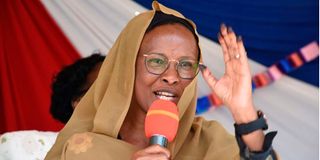Political goodwill will attract more female aspirants

Fatuma Dullo entered history books on being elected as the first woman Senator of Isiolo County in a generally conservative community.
What you need to know:
- There is nothing wrong with a woman politician seeking to go to Parliament through a political party nomination list or top up.
- History has shown that nomination of women to Parliament by political parties has borne fruits in as far as producing formidable elected women is concerned.
- In 2017, three women governors and a similar number of senators were elected, a huge improvement from 2013.
The National Assembly Speaker Justin Muturi was last month quoted in the media making a call to women keen on joining politics to venture into the field instead of waiting for nominations.
The former MP for Siakago Constituency, also advised women nominated to Parliament or County Assemblies to use the five-year experience to go for elective seats instead of waiting to be selected again.
He argued that mentorship of younger female politicians by the experienced women would increase the number of women in both Parliaments and at County Assemblies.
His position would hopefully deal with the unresolved gender inequality issue as stipulated in Article 27 of the Constitution that not more than two-thirds of either gender shall occupy elective and appointive positions.
Eleven years since inauguration of the 2010 Constitution, however, the gender rule is yet to be implemented, specifically at the Parliamentary level.
This failure to actualise the provision has since given room to quarrels, misinterpretations and even confusion over the meaning and implication of this rule by those on either side of the political divide.
The Constitution is also explicit and specific on how to implement the rule at the County Assemblies as stipulated in Articles 177 and 197.
It is noteworthy that the closer the country gets to a General Election, the louder calls and similar ‘advice’ to women to not “sit back and wait for nominations” but get into the field and ‘competitively fight it out with others’ (read men) grow.
Competitive nominations
The generalisation notwithstanding, there is nothing wrong with a woman politician seeking to go to Parliament through a political party nomination list or top up.
And the number of those who may expect a nomination may not be substantial given that only those known closely to their political party leadership at the national and county levels, would benefit from such sought after and competitive nominations, as is the practice.
A look at the number of women elected to Parliament since the 2013 General Election shows some progress even as the numbers remain dishearteningly low.
In 2017, three women governors and a similar number of senators were elected, a huge improvement from 2013. In addition, Sophia Abdi Noor made history as the first female to be elected MP for Ijara Constituency in the conservative North Eastern Kenya region.
Fida Kenya report
Similarly, Fatuma Dullo also entered the history books on being elected as the first woman senator of Isiolo County, in a generally conservative community.
A report by the National Democratic Institute and Fida Kenya months after 2017, says 29 per cent more women ran for the General Election in that year compared to 2013.
However, as the report correctly observes, the gains notwithstanding, huge barriers thwart women’s full participation in competitive elective politics. For as long as these barriers, compounded by strong patriarchal structures remain in place, the political field will continue to favour the male gender.
There is, however, a ray of hope. Consistent efforts to empower the voter through education and encourage women to contest, appear to slowly bear fruit, explaining the presence of more elected women.
A lot of work at the political party level must, however, continue for a more democratic, transparent and fairness in safeguarding the place of women politicians.
In addition, history has shown that nomination of women to Parliament by political parties has borne fruits in as far as producing formidable elected women is concerned. Some of Kenya’s strong women elected politicians in single constituencies started off as nominated legislators.
They include Millie Mabona, the MP for Suba North who got to Parliament in 2008 as a nominated legislator. Since then, she has been elected and re-elected.
Cecily Mbarire the former MP for Runyenjes was first nominated in 2002, was elected continuously until 2017 when she failed in her governorship bid. She is back in the National Assembly nominated by Jubilee Party.
The list also includes Fatuma Dullo, Sophia Abdi Noor and Gender CAS Beatrice Elachi, a former County Assembly Speaker who started off as a nominated senator and later unsuccessfully contested the Dagoretti South Constituency seat.
This, then is a clear indication that with political goodwill, the country can remove key barriers to women’s full participation in politics, which will be a win for Kenya.
Ms Rugene is a former Parliamentary Editor at the Nation and founder, The Woman’s Newsroom Foundation.





